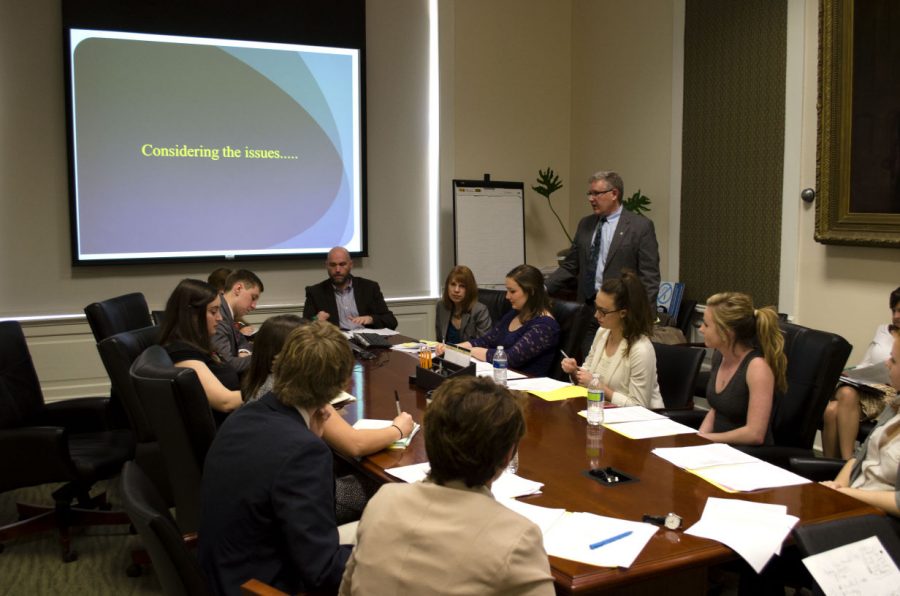Tulane establishes 24-hour hotline to aid mental health awareness
January 28, 2015
A 24-hour mental health hotline was established at the roundtable discussion between administrators, students and Undergraduate Student Government senators held Jan. 20.
The projected timeline has the hotline in place within the next 2-3 months on campus. Counselors who can assist with mental health emergencies quickly and efficiently will staff the hotline.
The hotline was one of several initiatives established at a roundtable discussion held in response to concerns that the administration lacked a proper response to several student deaths that occurred last semester.
Lauren Barr, director of the student health advisory council, said at the USG meeting Tuesday that she believes the hotline is one of the most important initiatives established at the roundtable.
Junior Anna Farmer said she thought the hotline would be an asset to the University.
“[The hotline] could be as simple as someone to lend an ear,” Farmer said. “I know people aren’t always comfortable talking with their friends so having someone non-judgmental and objective could help.
President Michael Fitts said the hotline will be introduced into the Tulane community as quickly and smoothly as possible.
“The university will work with the company that will provide the after-hours service over the next several months to make sure it is congruent with Tulane’s needs and meets all professional standards,” Fitts said. “The university hopes to have the line operational later this spring.”
The only similar hotline on campus is the Sexual Assault Peer Hotline and Education operated by Tulane students.
USG President Morgan Wittenberg and Fitts both said the roundtable discussion was successful and will bring change to the community.
Wittenberg said the roundtable discussion had five focus areas, including 24-hour accessibility, staff, faculty and administrative engagement, tailored resources, catering to vulnerable populations and community support for mental well-being.
“The five focus areas that the students presented aligned very nicely with the focus areas that Campus Health identified as priority projects,” Wittenberg said. “I was extremely impressed with the preparation, review and progress [the administration] made over winter break.”
The discussion ended with the introduction of several changes and new initiatives within the community designed to help address mental health concerns on Tulane’s campus.
“The roundtable was an honest, frank and productive discussion of student mental health needs,” Fitts said. “It is absolutely essential to have students as partners in our efforts to enhance mental health care and awareness, and the roundtable was another invaluable opportunity for me to hear directly from students on this important subject.”
Barr is working with Fitts, Vice President for Student Affairs Dusty Porter, USG members and students to review and re-evaluate Counseling and Psychological Services based on feedback provided by students. SHAC has also been promoting that it is accepting students who wish to be a part of the committee.
Assistant Vice President of Campus Health Scott Tims and Director of CAPS Donna Bender emailed the student body on Monday with more information outlining more of these changes.
Part of the first step is changing the way CAPS is marketed, including remaking an enhanced CAPS website and creating new promotional posters better detailing the services CAPS provides.
The email contained information about new CAPS policies, including the introduction of a new intake process and the creation of new support groups such as the grief and loss group and sexual assault group. The new intake process now involves an initial meeting with a consultant to determine which counselor can best assist the student.
CAPS will also designate one counselor to serve students who require immediate service, accepting them as walk-ins and treating them for urgent mental health concerns.
Administrators and students Eric March, Megan Plotka and Rebecca Roth have been working to start an Active Minds chapter on Tulane’s campus. Active Minds is a national student-run advocacy organization that works to raise campus awareness of mental health issues and destigmatize seeking help. They are currently in the process of formally establishing the club later this semester.
For more information about the staff changes read this article.






















Leave a Comment